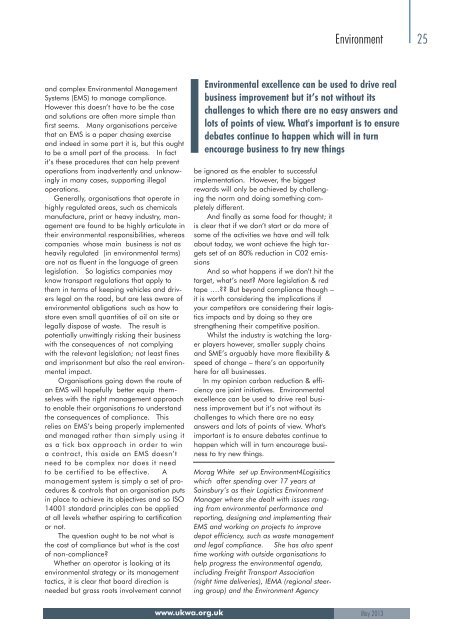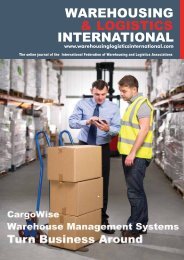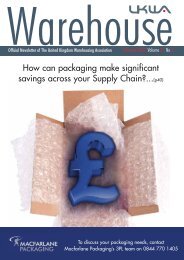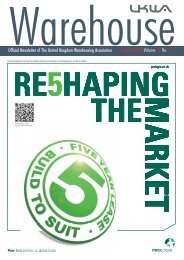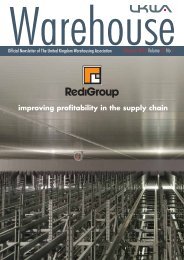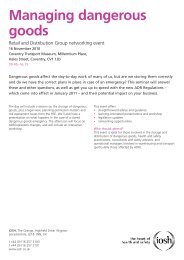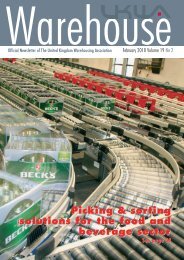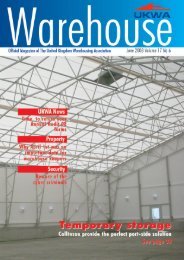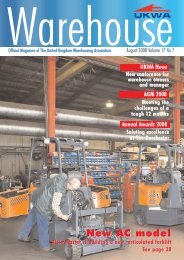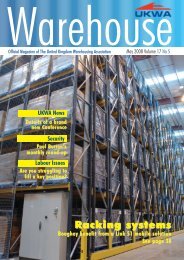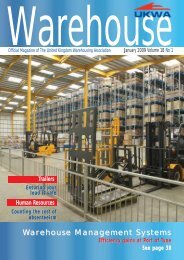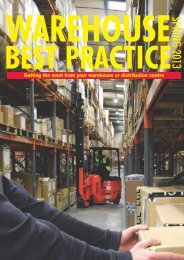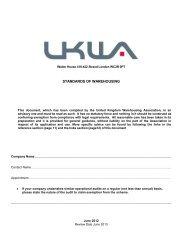Warehouse - United Kingdom Warehousing Association
Warehouse - United Kingdom Warehousing Association
Warehouse - United Kingdom Warehousing Association
Create successful ePaper yourself
Turn your PDF publications into a flip-book with our unique Google optimized e-Paper software.
Environment 25and complex Environmental ManagementSystems (EMS) to manage compliance.However this doesn’t have to be the caseand solutions are often more simple thanfirst seems. Many organisations perceivethat an EMS is a paper chasing exerciseand indeed in some part it is, but this oughtto be a small part of the process. In factit’s these procedures that can help preventoperations from inadvertently and unknowinglyin many cases, supporting illegaloperations.Generally, organisations that operate inhighly regulated areas, such as chemicalsmanufacture, print or heavy industry, managementare found to be highly articulate intheir environmental responsibilities, whereascompanies whose main business is not asheavily regulated (in environmental terms)are not as fluent in the language of greenlegislation. So logistics companies mayknow transport regulations that apply tothem in terms of keeping vehicles and driverslegal on the road, but are less aware ofenvironmental obligations such as how tostore even small quantities of oil on site orlegally dispose of waste. The result ispotentially unwittingly risking their businesswith the consequences of not complyingwith the relevant legislation; not least finesand imprisonment but also the real environmentalimpact.Organisations going down the route ofan EMS will hopefully better equip themselveswith the right management approachto enable their organisations to understandthe consequences of compliance. Thisrelies on EMS’s being properly implementedand managed rather than simply using itas a tick box approach in order to wina contract, this aside an EMS doesn’tneed to be complex nor does it needto be certified to be effective. Amanagement system is simply a set of procedures& controls that an organisation putsin place to achieve its objectives and so ISO14001 standard principles can be appliedat all levels whether aspiring to certificationor not.The question ought to be not what isthe cost of compliance but what is the costof non-compliance?Whether an operator is looking at itsenvironmental strategy or its managementtactics, it is clear that board direction isneeded but grass roots involvement cannotEnvironmental excellence can be used to drive realbusiness improvement but it’s not without itschallenges to which there are no easy answers andlots of points of view. What's important is to ensuredebates continue to happen which will in turnencourage business to try new thingsbe ignored as the enabler to successfulimplementation. However, the biggestrewards will only be achieved by challengingthe norm and doing something completelydifferent.And finally as some food for thought; itis clear that if we don’t start or do more ofsome of the activities we have and will talkabout today, we wont achieve the high targetsset of an 80% reduction in C02 emissionsAnd so what happens if we don’t hit thetarget, what’s next? More legislation & redtape ….?? But beyond compliance though –it is worth considering the implications ifyour competitors are considering their logisticsimpacts and by doing so they arestrengthening their competitive position.Whilst the industry is watching the largerplayers however, smaller supply chainsand SME’s arguably have more flexibility &speed of change – there’s an opportunityhere for all businesses.In my opinion carbon reduction & efficiencyare joint initiatives. Environmentalexcellence can be used to drive real businessimprovement but it’s not without itschallenges to which there are no easyanswers and lots of points of view. What'simportant is to ensure debates continue tohappen which will in turn encourage businessto try new things.Morag White set up Environment4Logisiticswhich after spending over 17 years atSainsbury’s as their Logistics EnvironmentManager where she dealt with issues rangingfrom environmental performance andreporting, designing and implementing theirEMS and working on projects to improvedepot efficiency, such as waste managementand legal compliance. She has also spenttime working with outside organisations tohelp progress the environmental agenda,including Freight Transport <strong>Association</strong>(night time deliveries), IEMA (regional steeringgroup) and the Environment Agencywww.ukwa.org.uk May 2013


